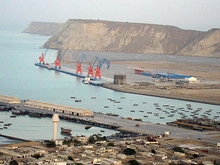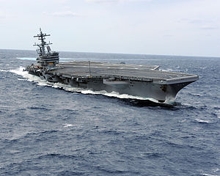China’s military-strategic objectives derive from the many needs of its foreign trade and the foreign policy issues that are related to those activities. What does the relationship between military power, foreign trade and foreign policy look like in general? For example, if a given nation is dependent on receiving its resources by sea, it will obviously give its navy the highest force development priority.
If energy imports travel long distances by sea, the country needs to concern itself with developing a carrier force and constructing naval bases and resupply stations outside the country. This is the route that China must now take because it has become an “island” economy.
Japan relies on the protection of the US military to resolve its maritime security problems. In exchange, it naturally must make both political and economic concessions to the United States. Not all Japanese are happy about that, but they lost the war in the Pacific.
China recently finished work on its first aircraft carrier, the Liaoning, which had been built in the USSR. Just two months later, on 21 November, the China State Shipbuilding Corporation Chairman Hu Wenming said: “We must enhance our independent weapons and equipment research and production capacity to match the country’s clout, and independently build our own aircraft carriers.”
Hu’s statement was not a declaration of war; it was a statement of intent. However, as China’s military forces develop along the lines laid out by Hu, a military clash between the United States and China will become inevitable. It could happen around 2020, before the Chinese Navy reaches its maximum operational capability. The 2020 date is glimpsed quite often in statements by senior US government officials.
Let us suppose that the Chinese government has decided to challenge the United States for control of its maritime oil imports. What problems does Beijing face?
First of all, the construction of aircraft carriers and warships to support them is a very expensive undertaking. For example, the George W. Bush, America’s last aircraft carrier (commissioned in 2009) cost US taxpayers $6.2 billion, which is 10% of the military budget of a country like France, for example. France ranks fifth in the world in terms of defense spending.
By the way, need I remind you of the hole President George W. Bush put in the US budget and how much he spent on the military during his eight years in office?
The cost of the next generation US aircraft carrier, the Gerald R. Ford, is estimated at $8.1 billion, and that does not include the $2.4 billion spent on research and development. The actual cost of the new super ship will undoubtedly be much higher. Are you aware of everything involved in military force development and highway construction?
No one disagrees — the Chinese have earned a huge amount of dollars exporting sneakers to the United States and the EU. Aircraft carrier construction may be a good investment for Beijing. There is, however, a “but.” The US Federal Reserve issues the currency that traders throughout the world have been happy to accept in payment of debts for over 100 years. However, George W. Bush’s presidency shows that defense spending can derail the economy of the world’s most powerful country, and it can do so very quickly.
Second, the United States has been building aircraft carriers since the 1920s. They have accumulated a vast amount of experience. Especially in training personnel. George Friedman of Stratfor correctly says: “Developing admirals and staffs capable of commanding carrier battle groups takes generations. Since the Chinese have never had a carrier battle group in the first place, they have never had an admiral commanding a carrier battle group.”
Relations between the United States and China are somewhat similar to relations between the U.S. and Japan in the first half of the 20th century I should mention that the United States is perfectly capable of creating huge problems for itself. We know why Commodore Perry opened Japan. We also know why British and American capital financed the modernization and construction of its navy. It was all done to counter Russia, and it ended in the Battle of Tsushima. But it is also very useful to remember what happened next. The Japanese war machine that had been cultivated by Anglo-American capital somehow suddenly turned against its creator.
By drawing on the resources of mainland China, Japan could oppose the United States in the Pacific Ocean and might have even crushed it. The United States could not have defeated Japan without the atomic bomb. That is quite clear. Washington had the bomb and Tokyo did not, so relations between the former deadly enemies reached a new level after the 6th and 9th of August, 1945.
Just as with Japan, Washington has contributed a great deal to China’s rise and progress. Is it possible that Western capital in general and US capital in particular contributed little to China’s economic upswing and climb to the heights of power?
The United States and the EU clearly provided China with markets for reasons of commerce. They obviously strangled their own industry for the same reasons.
What can Washington now pull out of its hat for use against China, as it did against Japan in August 1945? It is worthwhile remembering that the US State Department regularly goes into hysterics about North Korea and nuclear weapons, whether they actually exist or are a skillfully created fiction. China actually has intercontinental ballistic missiles. That has been verified.
However, is a problem for the United States and NATO, not China.
So, China’s independent construction of an aircraft carrier fleet comparable to that of the US Navy, the development of services to support its maritime operation, and the construction of a network of naval bases and resupply stations are bound to bring China into military conflict with the United States.
Moreover, China’s entry into an arms race with the United States could cause it serious economic problems and impoverish it. We 
China can hardly be denied the right to build its own aircraft carrier fleet, but it makes little sense to start an arms race with the country it currently relies on for its economic well-being.
Is there no way out for China? Is there no way it can free itself the shackles of the West’s neo-colonialist policy? There is.
Perhaps China’s best option for opposing Western exploitation would be to focus on such well-known methods as “diversification” and “asymmetrical response.” I will discuss that in the last part of this article.
Konstantin Penzev is an author and historian and a columnist for New Eastern Outlook.

